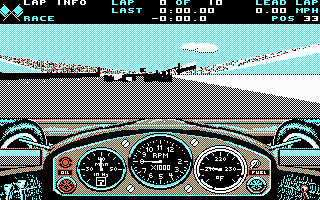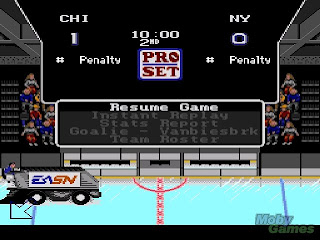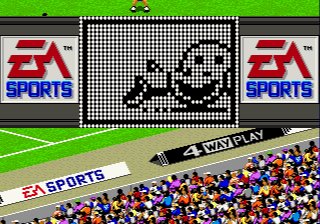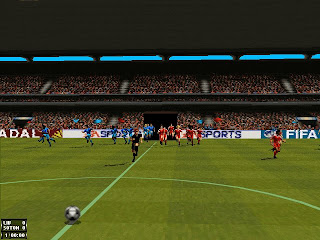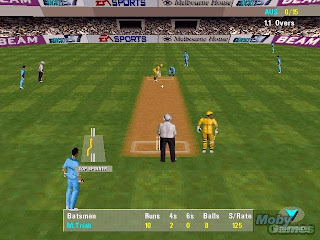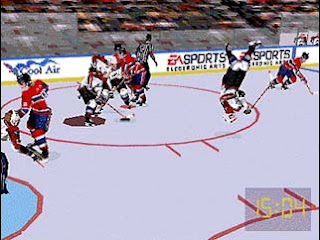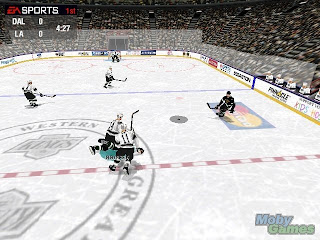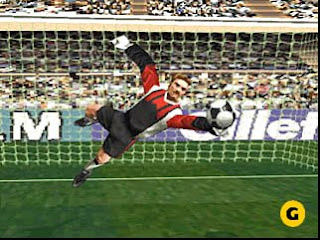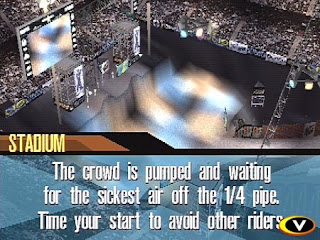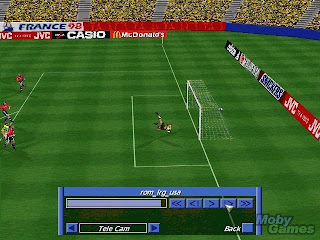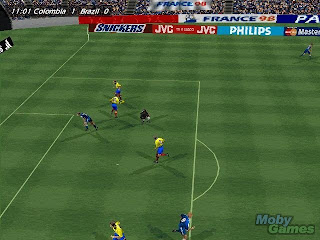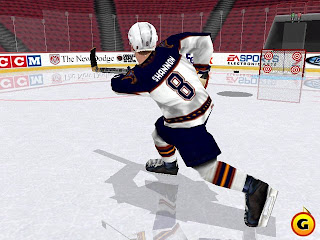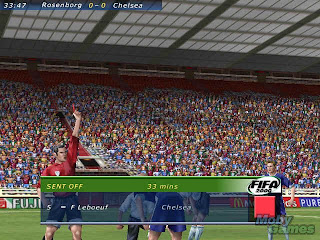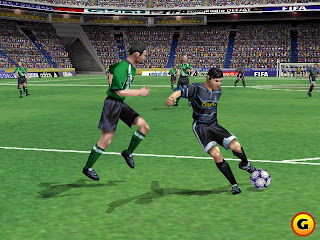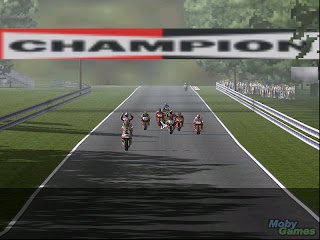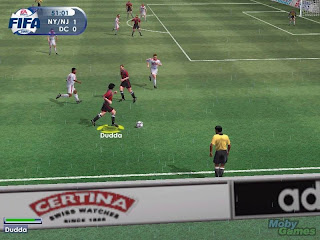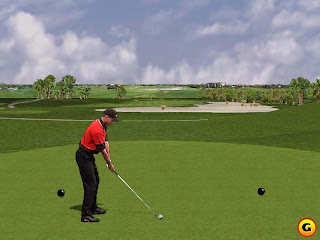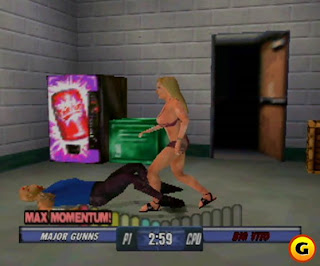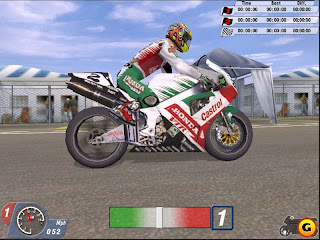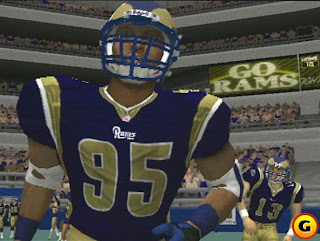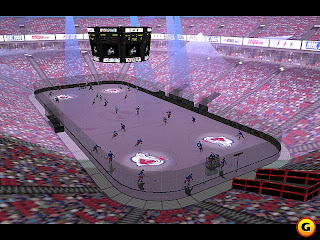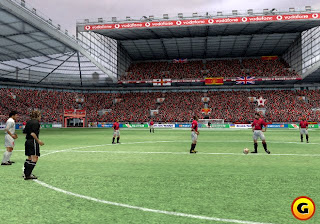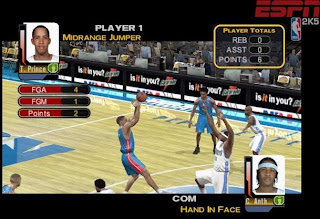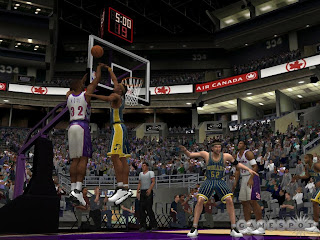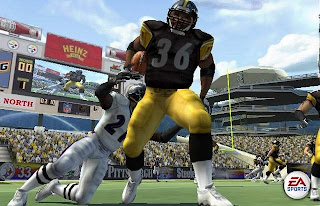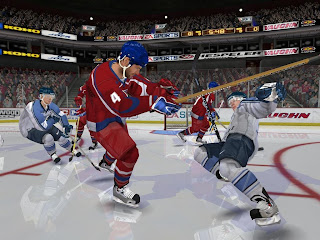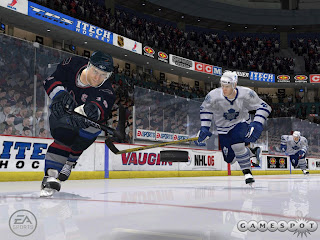This is a rerun of a series of blog posts I did back in April 2006 while researching things for my grad thesis (bonus: an unpublished chapter on history). It documents the evolution of advertising in sports video games published by Electronic Arts between 1983 and 2006. Since many AdLab readers probably haven’t seen it, and the stuff is pretty fascinating, I thought I’d repost it. The original raw research notes follow. Some links may since have expired.
[Also see 19 Tips for In-Game Advertising, a case study on Burger King’s games, the illustrated history with videos, and a lot of other good stuff posted here on AdLab about in-game advertising.]
I am writing the chapter on history of in-game advertising and decided to track down the evolution of sports games. I picked games made or published by Electronic Arts because the company has some of the most popular franchises, the games sold well, and also because these days the company seems to have a structured approach to selling ad space in their games. Below are screenshots from EA’s sports games made during the two decades between 1983-2006.
1983-1993
Dr. J and Larry Bird Go One on One, 1983, Electronic Arts. No ads.
World Tour Golf, 1985, Electronic Arts. No ads.
Earl Weaver Baseball, 1987, Electronic Arts. No ads.
Skate or Die, 1987, Electronic Arts. Ads for fictional products.
John Madden Football, 1988, Electronic Arts. No ads in this first installment in the long and lucrative Madden series.
Kings of the Beach, Electronic Arts, 1988. House ad for EA, Kool Cola (fictional), AVP (association of volleyball professionals), Clue (?), Juan Cuervo (?). The game was released for C64, NES and DOS. Same ads appear across platforms, but are unreadable on C64.
Indianapolis 500: The Simulation, 1989, Electronic Arts. No ads.
Lakers vs. Celtics and the NBA Playoffs, 1989, Electronic Arts. No ads besides the EA Sports banner at the judges’ table and NBA team names.
PGA Golf Tour, Electronic Arts, 1990. PGA Tour logo in the shop and on dialog screens. No other ads.
NHL Hockey, Electronic Arts, 1991. It is unlikely but chronologically possible that the “SHARK” board refers to the Shark energy drink. The other boards seem to be mere decorations or ads for fictional products. Two other notable 1991 sports games by EA are John Madden Football II, an upgrade of the 1988 game, and John Madden Football 92, the next installment in the franchise. Neither of them had third-party ads, judging by the screenshots.
NHLPA Hockey, Electronic Arts, 1993. House ad (EA Sports Network, EASN that reads like ESPN) on ice resurfacer. Other games that came out that year – John Madden Football 93 and two basketball games – feature house ads.
Screenshots from a few games by other publishers:
Championship Baseball, 1987, Activision/Gamestar. House ad for Gamestar.
ABC Monday Night Football, 1989, Data East. No ads.
Super Real Basketball, 1990, Sega. House ads on the court.
1994-1998
FIFA International Soccer, 1994 (on most platforms), Electronic Arts. This is the first installment in the long series of FIFA-licensed games. It also seems to be the first to feature third-part brands on the field. Notice how the Adidas ad was replaced with a generic billboard on the Genesis version of the game. Compare all versions here.
Other games that came out in 1994 – NBA Showdown, NBA Live 95, PGA Tour Golf 3, NHL 95 had either no ads, house ads, or logos of the respective license holders.
FIFA Soccer 96, 1995, Electronic Arts. The game introduced a new level of realism into its class. The field adorned with billboards and looked especially realistic, although it is hard to tell whether there were any third-party ads (there is a billboard for “TADAL”, but I don’t know if it’s a real brand). No third-party ads inother titles that year.
Cricket 97, 1996, Electronic Arts. More house ads in this andother games released that year (Melbourne House and Beam are development studios).
NHL 97, 1996, Electronic Arts (image source: Gamespot). The Windows version of the game featured ads for Coolair and possibly others.
NCAA Football 98, 1997, Electronic Arts. Second NCAA game (first one by Mindscape came out in 1994). Features an ad for Nokia.
NHL 98, 1997, Electronic Arts. Multiple third-party brands, most notably by Mastercard, Coca-Cola and Easton (manufacturer of sports gear – see site).
FIFA: Road to the World Cup 98, 1997, Electronic Arts. In Windows version, ads for Gillette, Mastercard. Versions for other platforms don’t seem to have third-party ads.
X Games: Pro Boarder, 1998, Electronic Arts (image: Gamespot). Plenty of placeholders in this snowboarding game, and possibly third-party ads.
World Cup 98, 1998, Electronic Arts. Many third-party billboards, including ads by Opel, Mastercard, Snickers, McDonald’s, Philips, Casio and JVC. The same ads are also present in the PS and N64versions.
NHL 99, 1998, Electronic Arts (image: Gamespot). Cross-platform field ads for Wendy’s, Bauer.
Apparently, no ads on NCAA Football 99, NBA Live 99, Knockout Kings boxing title, or Tiger Woods 99.
1998-2000
NHL 2000, 1999, Electronic Arts (image: Gamespot). Ads for Dodge, Mastercard, skates maker CCM, and apparently Target.
Madden NFL 2000, 1999, Electronic Arts. Still no third-party ads in this installment.
FIFA 2000: Major League Soccer, 1999, Electronic Arts. Ads for music labels Skint and Apollo 440, Adidas, McDonald’s, Fuji, UNICEF, Eurosport. No ads in the GameBoy version. Still no ads in other franchises: Knockout Kings 2000, NBA Live 2000.
Superbike World Championship, 1999, Electronic Arts. Abundant logos of Champion (Aerospace?), bike maker logos, unidentified others.
FIFA 2001, 2000, Electronic Arts. Third-party ads as usual.
Knockout Kings 2001, 2000, Electronic Arts. No changes from the previous version.
Tiger Woods PGA Tour 2001, 2000, Electronic Arts. The golfing franchise still has no apparent ads but lets you play different celebrities. Features branded courses (e.g. Buick PGA Tour Courses).
WCW Backstage Assault, 2000, Electronic Arts. This wrestling game for N64 has a fake soda machine.
Superbike 2001, 2000, Electronic Arts. Sponsor brands on bikes.
2001-2002
Madden NFL 2002, 2001, Electronic Arts (top image: Gamespot). Name of the helmet maker, Riddell, is now more legible. Ad for Upper Deck (probably the first for the franchise), a trading cards company. Ad for Riddell.com.
NCAA Football 2002, 2001, Electronic Arts (image: Gamespot). No apparent third-party ads.
Tiger Woords PGA Tour 2002, 2001, Electronic Arts (image:Gamespot). Nike’s branding that appears on the box art becomes distinguishable in-game.
Tiger Woods PGA Tour 2003, 2002, Electronic Arts (image:Gamespot). Nike’s branding becomes more prominent. Still no other brands and no ads in this virgin environment.
NHL 2003, 2002, Electronic Arts (image: Gamespot). Amazingly detailed graphics, but no obvious third-party ads.
FIFA Soccer 2003, 2002, Electronic Arts (image: Gamespot). Multi-level billboards with ads for Vodafone, McDonald’s, Fuji, Hyundai, Toshiba and others.
NCAA Football 2003, 2002, Electronic Arts (image: Gamespot). Compare the soccer stadium above with this ad-less football field.
2003-2006
NBA Live 2004, 2003, Electronic Arts (image: Gamespot) . EA’s NBA series continue to show no ads in contrast to Sega’s ESPN franchise or Microsoft’s NBA Inside Drive game below:
ESPN NBA 2K5, 2004, Sega. Ads for Gatorade. Scrolling ad units.
NBA Inside Drive 2004, 2003, Microsoft. Ad for Air Canada. The ad unit is scrollable.
Madden NFL 2005, 2004, Electronic Arts. An unbranded PDA device (compare to the famously branded one in Splinter Cell).
Madden NFL 06, 2005, Electronic Arts (image: Gamespot). Ad for Heinz (or not; it’s a replica of Heinz stadium). Again, compare to Sega’s ESPN NFL 2K5:
ESPN NFL 2K5, 2004, Sega. Billboards and product placement for Gatorade (image: Gamespot).
Both 2005 and 2006 versions of EA’s NHL are healthily full of ads:
NHL 2005, 2004, Electronic Arts (image: Gamespot)
NHL 2006, 2005, Electronic Arts (image: Gamespot).







